
Sir Edward Herbert (c. 1648 – November 1698), titular Earl of Portland, was an English judge who served as Chief Justice of the King's Bench during the reign of James II.

Sir Edward Herbert (c. 1648 – November 1698), titular Earl of Portland, was an English judge who served as Chief Justice of the King's Bench during the reign of James II.
Herbert was a younger son of Sir Edward Herbert, Lord Keeper to Charles II, and his wife, Margaret, daughter of the Master of Requests, Thomas Smith of Abingdon, Berkshire (now Oxfordshire) & Parson's Green, Middlesex, and widow of Thomas Carey of Sunninghill Park, Berkshire. He was brother of Arthur Herbert, 1st Earl of Torrington and became a scholar of Winchester in 1661, aged 13. He was elected probationer fellow of New College, Oxford, in August 1665, and, having graduated B.A. on 21 April 1609, entered the Middle Temple, where he was called to the bar. He practiced for some years in Ireland, and was there made a King's Counsel on 31 July 1677.
Returning to England he was appointed Chief Justice of Chester on 25 Oct. 1683, and on 10 February in the following year was knighted at Whitehall. In January 1684-5 he succeeded Sir John Churchill as Attorney General to the Duke of York, on whose succession to the crown he was appointed Attorney General to the queen. On 15 April he was returned to parliament for Ludlow. Like his father he had the highest notions of the royal prerogative, which much helped his advancement. On 16 Oct. 1685 he was sworn of the Privy Council, and on the 23rd he was called to the degree of Serjeant, giving rings with the significant motto 'Jacobus vincit, triumphat lex,' and the same day took his seat as Chief Justice of the King's Bench in succession to Jeffreys, who had been appointed lord chancellor. Jeffreys characteristically exhorted Herbert on this occasion to 'execute the law to the utmost of its vengeance upon those that are now known, and we have reason to remember them, by the name of whigs,' and 'likewise to remember the snivelling trimmers,' because 'our Saviour Jesus Christ says in the gospel that they that are not for us are against us '.
At the Rochester spring assizes in 1686 Sir Edward Hales, a Roman Catholic, was convicted for holding and acting under a commission in the army without taking the sacrament and the oaths of supremacy and allegiance in the manner prescribed by the Test Act. Thereupon his coachman, Arthur Godden, brought a collusive action against him in the king's bench for the prescribed penalty of £500, to which Hales demurred, pleading a dispensation under the great seal. The case was argued before Herbert, who delivered formal judgment as follows : ' (1) That the kings of England are sovereign princes; (2) that the laws of England are the king's laws; (3) that therefore it is an inseparable prerogative in the kings of England to dispense with penal laws in particular cases, and upon particular necessary reasons; (4) that of these reasons and these necessities the king himself is the sole judge.' The plaintiff was accordingly nonsuited. The judgment occasioned general consternation in the country, and the judges were treated with scant respect on circuit. It was impugned as bad in point of law by Sir Robert Atkyns (1621–1709) in a tract entitled ' An Enquiry into the Power of dispensing with Penal Statutes.' Herbert replied with 'A Short Account of the Authorities in Law upon which judgment was given in Sir Edward Hales's case,' in which he argued that 'whatever is not prohibited by the law of God, but was lawful before any act of parliament made to forbid it, the king by his dispensation granted to a particular person may make lawful again to that person who has such dispensation, though it continues unlawful for everybody else.' Atkyns rejoined, and William Atwood, a barrister, also examined Herbert's vindication with much learning and ability.
On 14 July 1686 Herbert was placed on the newly created ecclesiastical commission, a tribunal invested with as extensive jurisdiction over the clergy as the old Court of High Commission, and of which Jeffreys was the president. Having, however, refused to abet the king's design of introducing martial law by declining to order the execution of a deserter from the army, he was transferred to the chief-justiceship of the common pleas in April 1687, being succeeded in the king's bench by the more compliant Robert Wright. He still retained his place on the ecclesiastical commission, but gave further offence to the king by expressing the opinion that his proceedings in the case of Magdalen College could not be legalised by any exercise of his dispensing power, and by voting against the inhibition of the recalcitrant fellows from the exercise of their clerical functions.
On the flight of the king Herbert followed him to France and afterwards to Ireland, and was accordingly excepted from the bill of indemnity and included in a Bill of attainder. The latter bill lapsed owing to an early prorogation, but Herbert's estates were sequestrated, the royal palace of Oatlands, Weybridge, Surrey, which had been granted to him by James shortly before his abdication, being given to his brother Arthur, Earl of Torrington, who had taken the opposite side in politics. On the suppression of the Irish rebellion Herbert returned with James to France and resided for a time at St. Germain-en-Laye. He received from James the title of Earl of Portland and the office of Lord Chancellor, and busied himself in writing manifestos for his master. As a Protestant he had never enjoyed James's full confidence, and being a somewhat free speaker he soon lost what he had, was dismissed, and retired to Flanders in the autumn of 1692. He afterwards returned to St. Germain-en-Laye, where he subsisted principally on the charity of his brother until his death in November 1698. He was unmarried. Burnet says of him that, though he was but an indifferent lawyer, 'he was a well-bred and a virtuous man, and generous and good-natured.'

George Jeffreys, 1st Baron Jeffreys, also known as "the Hanging Judge", was a Welsh judge. He became notable during the reign of King James II, rising to the position of Lord Chancellor. His conduct as a judge was to enforce royal policy, resulting in a historical reputation for severity and bias.
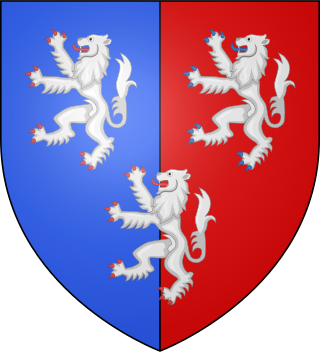
Sir Edward Herbert of Aston in Montgomeryshire, was an English lawyer and politician who sat in the House of Commons at various times between 1621 and 1641. He was Attorney-General under King Charles I.

Admiral Arthur Herbert, 1st Earl of Torrington was a Royal Navy officer and politician. Dismissed by James II of England in 1688 for refusing to vote to repeal the Test Act, which prevented Catholics from holding public office in England, he brought the Invitation to William to William of Orange at The Hague, disguised as a simple sailor. As a reward he was made commander of William's invasion fleet which landed at Torbay, Devon on 5 November 1688, which initiated the Glorious Revolution.
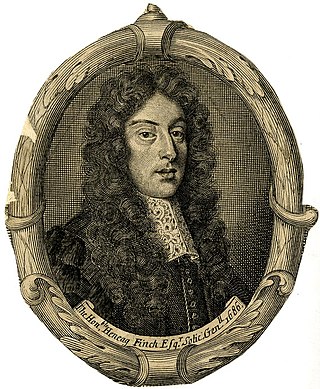
Heneage Finch, 1st Earl of Aylesford, PC, KC was an English lawyer and statesman.
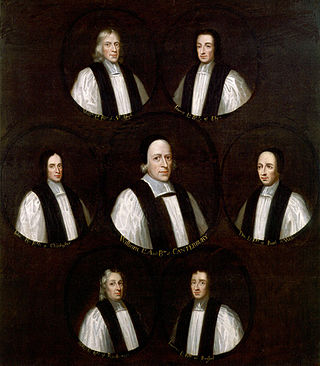
The Seven Bishops were members of the Church of England tried and acquitted for seditious libel in the Court of Kings Bench in June 1688. The very unpopular prosecution of the bishops is viewed as a significant event contributing to the November 1688 Glorious Revolution and deposition of James II.

The Barons of the Exchequer, or barones scaccarii, were the judges of the English court known as the Exchequer of Pleas. The Barons consisted of a Chief Baron of the Exchequer and several puisne (inferior) barons. When Robert Shute was appointed second baron in June 1579 the patent declared "he shall be reputed and be of the same order, rank, estimation, dignity and pre-eminence to all intents and purposes as any puisne judge of either of the two other courts." The rise of commercial trade in Elizabethan England occasioned fraudulent application of the Quo minus writ. More taxation demanded staff at the exchequer to sift an increase in the case load causing more widespread litigation cases to come to the court. From the 1580s onwards the Barons of Exchequer were no longer held in such low regard, and more likely to be Serjeants-at-law before qualification. The Inns of Courts began to exclude solicitors, and held posts for judges and barons open equally to barristers. In 1591, Regulations reflected a case in which the Lord Keeper Egerton banned solicitors from seeking cases in the Exchequer.
The Chief Baron of the Exchequer was the first "baron" of the English Exchequer of Pleas. "In the absence of both the Treasurer of the Exchequer or First Lord of the Treasury, and the Chancellor of the Exchequer, it was he who presided in the equity court and answered the bar i.e. spoke for the court." Practically speaking, he held the most important office of the Exchequer of Pleas.
Events from the year 1686 in England.
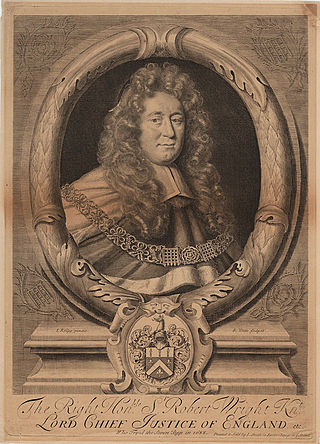
Sir Robert Wright was an English judge and Chief Justice of the King's Bench 1687–89.
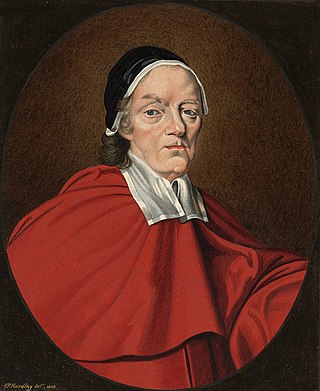
Sir John Maynard KS was an English lawyer and politician, prominent under the reigns of Charles I, the Commonwealth, Charles II, James II and William III.

Sir Robert Atkyns (1620–1710) was an English Lord Chief Baron of the Exchequer, Member of parliament, and Speaker of the House of Lords.

Sir John Powell was a Welsh judge on the Court of Common Pleas and the Court of King's Bench. He presided over the trial of the Seven Bishops in 1688.

The Case of Proclamations [1610] EWHC KB J22 is an English constitutional law case during the reign of King James I (1603–1625) which defined some limitations on the royal prerogative at that time. Principally, it established that the monarch could make laws only through Parliament. The judgment began to set out the principle in English law that when a case involving an alleged exercise of prerogative power came before the courts, the courts could determine:

Sir Samuel Barnardiston, 1st Baronet (1620–1707) was an English Whig Member of Parliament and deputy governor of the East India Company. He was the defendant in some high-profile legal cases and involved in a highly contentious parliamentary election.
Sir Edward Hales, 3rd Baronet was an English politician who sat in the House of Commons of England from 1679 to 1681. He became a Catholic and supported King James II at the time of the Glorious Revolution.
Sir Edward Atkyns was an English lawyer and politician who sat in the House of Commons in 1660. He was the Chief Baron of the Exchequer from 1686 to 1689.
Sir William Montagu was an English judge and politician who sat in the House of Commons variously between 1640 and 1695.
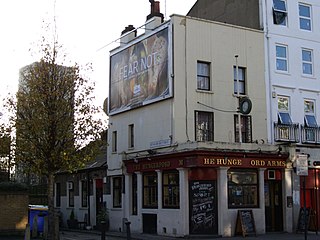
Thomas v Sorrell [1673] EWHC (KB) J85 is an English law case, concerning licences. It has been cited in cases in relation to land but has no direct link to land e.g. occupation. It was landmark decision in the law of alcohol licensing and summarizes centuries of law as to licences — it sets out the bold principles of licences of many kinds.
Godden v Hales was a 1686 King's Bench case that was brought as a test case of the Test Acts, a series of penal laws in Restoration England that established religious tests for public office with explicitly anti-Catholic intentions. The case hinged on the king's supposedly inalienable prerogative to command the services of his subject, even contrary to acts of Parliament.